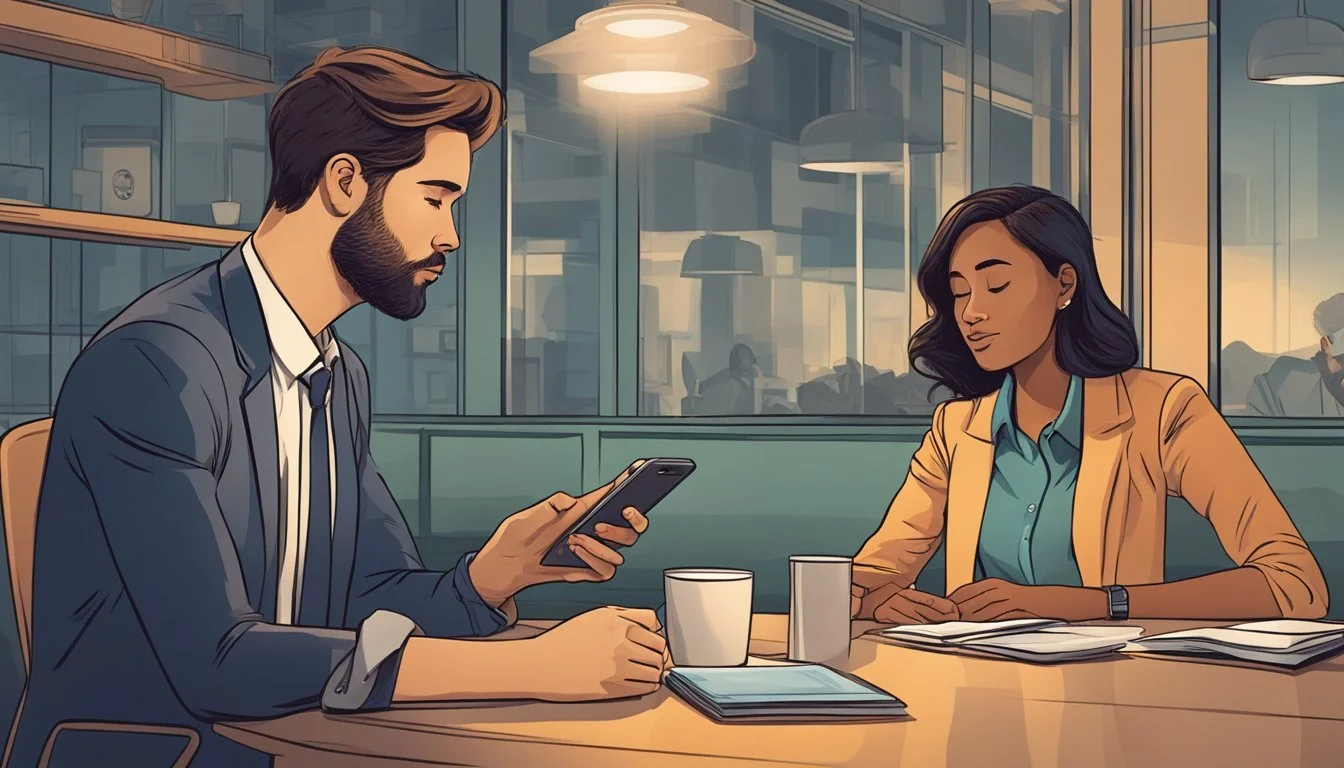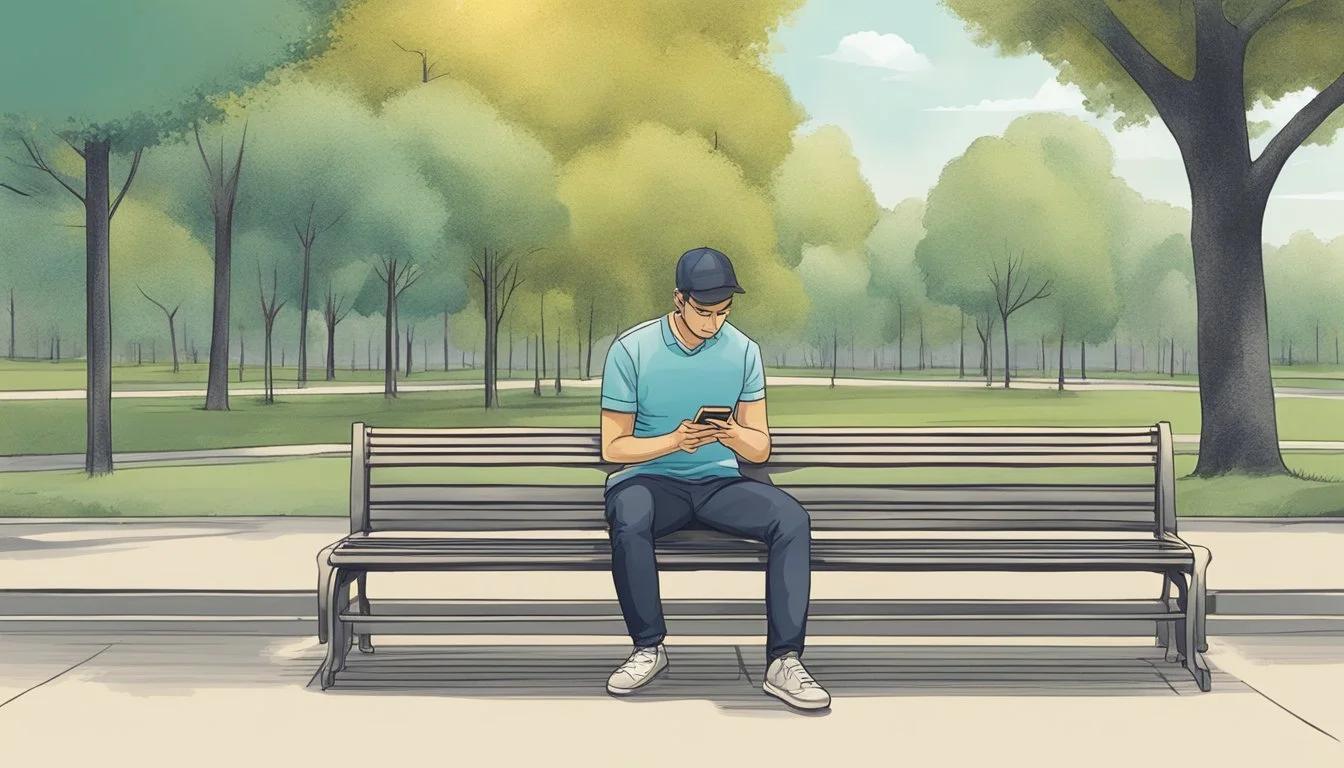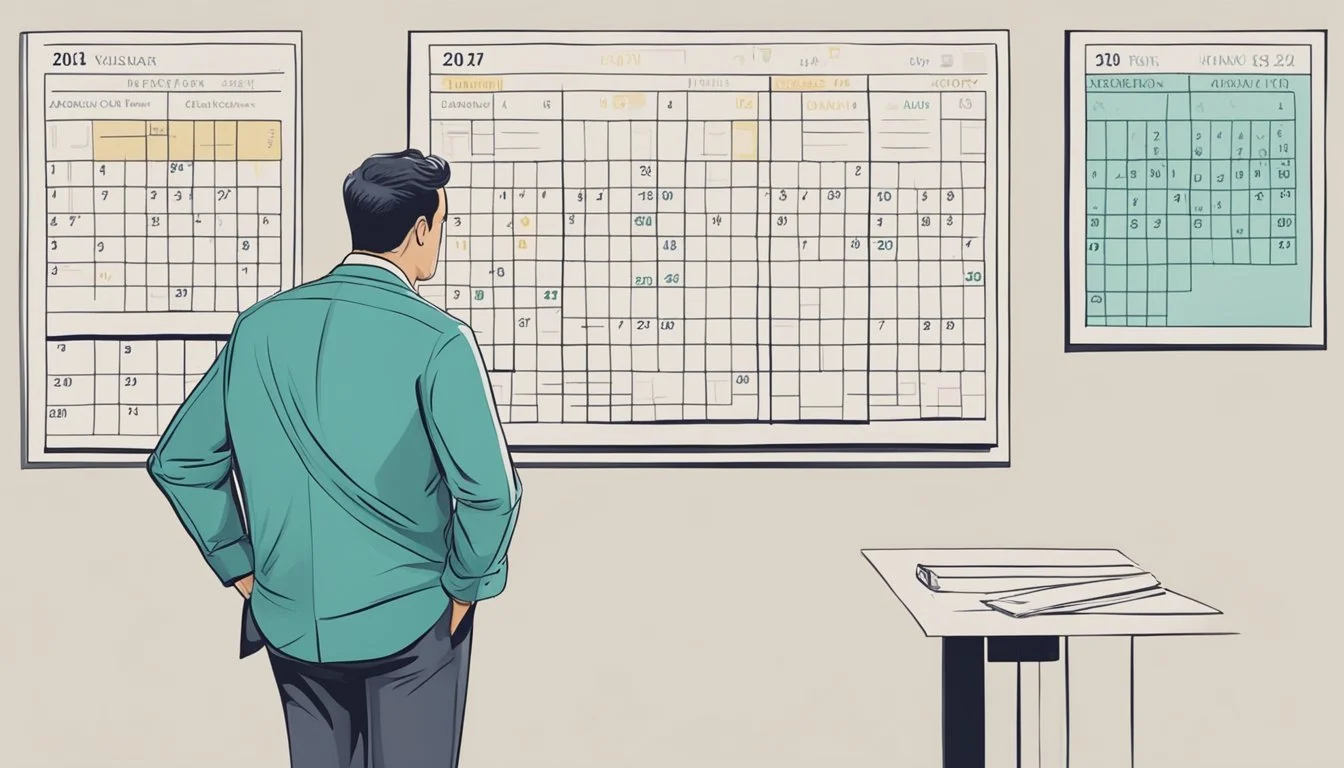12 Red Flags That Your Partner Is Emotionally Unavailable
Key Signs to Recognize
Navigating romantic relationships can be challenging, particularly when dealing with a partner who may be emotionally unavailable. Recognizing signs of emotional unavailability is crucial for maintaining a healthy and fulfilling relationship. Understanding these red flags can help individuals make informed decisions about their partnerships.
Emotional unavailability can manifest in various behaviors, from avoiding deep conversations to consistently canceling plans. By identifying these signs, one can better assess the dynamics of their relationship and seek the necessary changes or support.
1) Constantly Dismissive of Your Feelings
A common red flag is when a partner is constantly dismissive of your feelings. This behavior can manifest in various ways, including downplaying your emotions or telling you that you are overreacting.
Such a partner may frequently use phrases like "You're too sensitive" or "It's not a big deal." This can make you feel invalidated and unheard.
An emotionally unavailable partner might avoid discussing important emotional topics. They may change the subject or shut down conversations that require emotional depth, leaving you feeling frustrated and isolated.
Another sign is when they minimize your experiences and emotions by comparing them to their own or others'. Instead of empathizing, they might say, "That’s nothing compared to what I’ve been through."
This dismissive behavior can create an emotional disconnect. It often results in you feeling alone in the relationship, despite being physically together.
Continuously having your feelings dismissed can erode your self-esteem and confidence. It's important to recognize this pattern as it can signify deeper issues of emotional unavailability.
For more information about emotional invalidation, visit Live Bold and Bloom.
2) Avoids Deep Conversations
When a partner consistently avoids deep conversations, it can be a clear sign of emotional unavailability. Deep conversations often involve sharing personal thoughts, feelings, and experiences. A partner who is not willing to engage in these can create a barrier to emotional intimacy.
Emotionally unavailable individuals might dismiss or change the topic when the conversation gets serious or profound. This behavior can stem from discomfort with vulnerability or a lack of interest in forming a deeper connection.
Their reluctance may also show in their body language. They might avoid eye contact or exhibit defensive body language, such as crossing their arms. These physical cues often reflect their internal resistance to engaging on a deeper emotional level.
Another indicator is if they frequently steer the conversation back to superficial topics. Relationships thrive on open communication, and if one partner is reluctant to participate, it can create a significant emotional gap. This avoidance behavior might prompt concerns about the relationship’s future.
For more details, visit BetterHelp's article on emotionally unavailable partners where avoiding deep conversations is a common red flag. Recognizing these signs early can help address potential issues in the relationship.
3) Rarely Shows Empathy
Empathy is crucial in healthy relationships. Partners who rarely demonstrate empathy can create emotional distance.
People who are emotionally unavailable might struggle to connect with their partner's feelings. They may appear indifferent or dismissive during emotional conversations or ignore their partner’s emotional needs altogether.
Significantly, such individuals might overanalyze situations instead of offering genuine emotional support. Their tendency to remain "stuck in their head" can hinder their ability to validate their partner’s emotions.
A lack of empathy can also manifest through a partner’s minimizing of the need for emotional support. When confronted with their partner’s emotions, they may downplay the significance or react coldly.
Furthermore, emotionally unavailable partners might show less interest in mutual emotional exchanges. Their fear of intimacy or vulnerability often leads them to avoid deep emotional connections.
Chronic lateness or consistently being preoccupied during emotional discussions are other indicators of low empathy. These behaviors demonstrate a disregard for their partner’s feelings and a lack of commitment to emotional availability.
For more signs of emotional unavailability, visit Psychology Today.
Understanding these behaviors is essential for recognizing traits of emotional unavailability in relationships.
4) Inconsistent Communication
Inconsistent communication is a significant indicator of emotional unavailability in a partner. They may respond quickly and warmly at times, but then become distant or unresponsive at other moments. This erratic pattern can leave their partner feeling confused and insecure about the relationship.
Such partners often struggle with maintaining a regular flow of communication. They might start engaging conversations and then abruptly go silent for hours or even days. This inconsistency can make it hard to establish a stable connection.
Emotionally unavailable individuals may also tend to communicate only when it suits them. This can manifest in behaviors such as replying selectively to messages or making sporadic phone calls. These actions can point to their reluctance to fully engage emotionally.
Moreover, they might avoid discussing feelings or deeper emotional topics. When faced with such conversations, they either change the subject or provide vague responses. This avoidance creates gaps in understanding and connection between partners. For more details, you can read about the signs someone is emotionally unavailable.
5) Doesn't Share Personal Thoughts
An emotionally unavailable partner often refrains from sharing personal thoughts. This might manifest as vague or superficial responses to questions about their day or experiences.
They may avoid deep conversations. While small talk can be enjoyable, a reluctance to discuss meaningful topics indicates a reluctance to connect on a deeper level.
Such a partner might change the subject when asked about their feelings or opinions. This evasiveness can leave one feeling disconnected or unimportant.
They might also deflect personal questions and provide generic answers. For example, responding with "I'm fine" when asked how they are feeling.
This behavior suggests a discomfort with vulnerability. It can be challenging to build a strong emotional connection with someone who doesn't open up.
Understanding these signs can help identify emotional unavailability and navigate relationship dynamics more effectively. For more on signs of emotional unavailability, Oprah Daily provides additional insights.
6) Frequently Changes Plans
An emotionally unavailable partner often changes plans last minute. This behavior can be frustrating and disruptive for those who seek stability and reliability in a relationship. It may appear that the partner is uninterested or indifferent to shared activities.
When plans are frequently altered, it signals a lack of commitment. An emotionally unavailable partner might cancel or reschedule plans due to other priorities. This can leave the other person feeling unimportant.
Consistent plan changes can also be a way to avoid intimacy. By not committing to scheduled time together, the partner avoids deeper connection and emotional engagement. This avoidance pattern can be a significant red flag.
An emotionally unavailable individual may prioritize their needs and convenience. They often expect the other person to adapt to their schedule. This imbalance can create tension and resentment in the relationship.
Additionally, these frequent changes may lead to trust issues. The unpredictable nature of such behavior leaves the other person uncertain and insecure. Trust is a foundational element of a healthy relationship and is undermined when plans are consistently altered.
To understand more, consider these signs of emotional unavailability in relationships.
7) Prefers Distance Over Closeness
An emotionally unavailable partner often prefers maintaining distance over achieving closeness. They may evade moments that typically foster intimacy, such as deep conversations and quality time together.
When faced with emotional situations, they may pull away or become distant. This behavior might be a defense mechanism to avoid vulnerability.
They may also show a tendency to engage more in solo activities or insist on having their personal space consistently. These actions can signify a reluctance to develop a closer bond.
Instances where your partner insists on keeping conversations superficial or avoids discussing future plans can also be indicators. This avoidance can create a chasm in the relationship, making true intimacy difficult.
Recognizing these signs is crucial in identifying emotional unavailability. For more insights, you can read about these behaviors on BetterHelp.
8) Defensive When Confronted
An emotionally unavailable partner often becomes defensive when confronted. Instead of engaging in a conversation, they may react with hostility or dismissive comments. This defensiveness can create a barrier to open communication.
They might deny any wrongdoing, shift blame, or avoid the topic entirely. These tactics make it challenging to resolve conflicts and build a healthy relationship.
Defensiveness can also manifest as sarcastic remarks or criticism. This behavior can leave their partner feeling invalidated and unheard. Emotional unavailability often leads to a lack of vulnerability, making genuine connection difficult to achieve.
Understanding these signs can help in recognizing patterns that hinder emotional intimacy. Addressing them early on can be crucial for the relationship's health. For further insights, you can explore more here.
9) Struggles to Apologize
One red flag of an emotionally unavailable partner is their difficulty in apologizing. They may avoid taking responsibility for their actions, often shifting blame onto others or external circumstances.
Emotionally unavailable individuals might see apologies as a sign of weakness or vulnerability. This perception can stem from deep-seated fears or past experiences that make admitting fault challenging.
When faced with conflict, they may become defensive or dismissive rather than acknowledging their mistakes. This attitude can hinder the resolution of issues and create feelings of frustration and resentment in the relationship.
If your partner frequently struggles to say sorry, it can indicate a lack of emotional openness. This behavior suggests that they prioritize protecting their ego over fostering a healthy, communicative partnership. Understanding this behavior can help identify emotional unavailability and address it constructively.
10) Lacks Interest in Your Life
An emotionally unavailable partner often shows a lack of interest in your daily activities, thoughts, and emotions. You might notice that they rarely ask about your day or how you are feeling.
They may not engage in meaningful conversations about your dreams, goals, or even mundane events.
This lack of engagement can make you feel unvalued and lonely. Such partners usually prefer talking about their own experiences rather than listening to yours. When you try to share, they might seem distracted or disinterested, often steering the conversation back to themselves.
They might also forget important details about your life. For example, they could consistently miss events significant to you, like birthdays or anniversaries.
In some cases, an emotionally unavailable partner might not offer emotional support when you need it most. They may be absent during challenging times, leaving you to cope alone. This behavior suggests a lack of emotional investment in the relationship.
Observing these patterns can indicate that they are not genuinely interested in building a deeper connection with you.
11) Avoids Discussing the Future
An emotionally unavailable partner often avoids discussing future plans. They might deflect or change the subject when topics like long-term commitments, future goals, or aspirations come up.
This unwillingness to talk about the future can manifest in different ways. They might give vague answers or make jokes to avoid serious conversations about where the relationship is heading.
This can create a sense of uncertainty and instability in the relationship. When one partner is hesitant to discuss future plans, it could indicate a lack of commitment or deep emotional investment in the relationship. For more insights, you can explore the signs someone is emotionally unavailable.
12) Emotional Baggage from Past Relationships
Carrying emotional baggage from past relationships can be a significant indicator of emotional unavailability. When individuals haven't resolved issues from previous romances, they may struggle to open up in new ones.
Unresolved issues can manifest as trust issues, fear of intimacy, or a reluctance to commit. These behaviors create barriers to forming a healthy, intimate bond with their partner.
People with emotional baggage might also compare their current partner to their exes unfairly. This comparison can lead to unrealistic expectations and dissatisfaction in their present relationship.
Emotional baggage can stem from various experiences, such as infidelity, abuse, or abandonment in past relationships. These experiences can cause deep emotional wounds, making it difficult to move forward.
Those who carry emotional baggage might be reluctant to discuss their feelings or share personal experiences. This lack of communication can prevent a relationship from deepening and becoming more meaningful.
Addressing past emotional wounds typically requires introspection and sometimes professional help. Without this effort, the weight of past relationships continues to affect new ones.
Recognizing Emotional Triggers
Identifying emotional triggers is essential in understanding and addressing emotional unavailability. These triggers often lead to avoidance behaviors and strained relationships. Awareness can lead to healthier interpersonal dynamics.
Common Emotional Triggers
Common emotional triggers in relationships include past trauma, fear of rejection, and feelings of inadequacy. Individuals may react strongly to perceived criticism, abandonment, or non-acceptance.
Past traumatic experiences can shape one's responses to emotional situations, creating a pattern of avoidance or defensiveness. Fear of rejection might cause someone to avoid deep emotional connections, appearing distant or uninterested. Likewise, feelings of inadequacy can lead to hypersensitivity, manifesting in abrupt emotional withdrawal during conflicts.
When emotionally triggered, the affected person might display behaviors such as lashing out, shutting down, or becoming unresponsive. Understanding these triggers is the first step towards addressing the root causes and fostering a more emotionally aware relationship.
Effects of Unaddressed Emotions
Unaddressed emotional triggers can significantly impact a relationship. Emotional withdrawal often leads to misunderstandings, resentment, and a lack of intimacy. Partners may feel ignored, neglected, or unimportant, which can erode trust and sensitivity towards one another's feelings.
Chronic emotional suppression can also result in mental health issues such as anxiety, depression, and chronic stress. Individuals might resort to unhealthy coping mechanisms, further complicating relationship dynamics. Fear of confrontation and unresolved conflicts often linger, creating a cycle of emotional detachment.
By recognizing and addressing emotional triggers, partners can work together to overcome barriers, fostering a more supportive and understanding environment. Effective communication and empathy play crucial roles in mitigating the negative effects of unaddressed emotions.
Communicating Effectively with an Emotionally Unavailable Partner
Effective communication with an emotionally unavailable partner can help bridge the gap that often leads to misunderstandings. This requires an understanding of the barriers that exist and the use of specific techniques to foster healthier exchanges.
Understanding Communication Barriers
Identifying the reasons behind the emotional unavailability is crucial. Emotional unavailability might stem from past traumas or psychological issues, making it challenging for individuals to connect deeply. They may avoid emotional conversations and steer clear of topics involving feelings or the future of the relationship, as noted here.
Emotionally unavailable partners might also exhibit behaviors such as overanalyzing situations and struggling to relate to others’ needs, which can make communication feel one-sided. These individuals often prefer to only meet when it is convenient for them, which is another red flag highlighted in the article.
Techniques for Healthy Communication
Start by creating a safe space for open dialogue. This means approaching conversations without blame and showing understanding. As suggested here, explaining that healing requires hard work and mutual support is essential.
Consistency is key. Scheduling regular check-ins can help ensure that both partners feel heard and valued. Asking open-ended questions rather than making accusations can encourage more revealing responses. For instance, asking “How can I support you?” instead of stating “You never support me” can transform the conversation to a more positive direction.
Using "I" statements rather than "you" statements can further minimize defensiveness and promote a more constructive dialogue, as it focuses on expressing personal feelings rather than pointing fingers. This method can be particularly effective in reducing tensions and fostering a more open line of communication.













